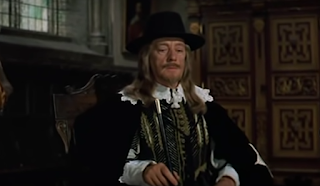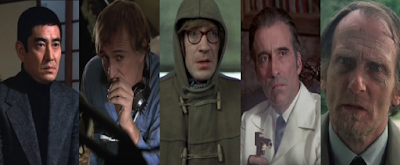James Earl Jones did not receive an Oscar nomination, despite being nominated for a SAG, for portraying Reverend Stephen Kumalo in Cry, The Beloved Country.
Cry, The Beloved Country tells the story of a South African Reverend who lives in the country and goes to the city to find his family only to discover his son has committed a terrible crime that also effects the reverend's wealthy white neighbor.
Jones plays the Reverend Kumalo who we first meet as a seemingly simple enough Reverend who goes about his life. Jones is a particularly good actor at simply seeming dignified from almost nothing and this presence of his certainly works well for the part. Even before Kumalo does anything we seem to already understand him through just that natural grace that Jones can exude so easily. Jones does not just leave him as just the good Reverend though, and importantly even before he goes to leave there is something wrong with him. Jones is very effective in the way he conveys that underlying distress in Kumalo that pains him. Jones portrays it well as a silent distress, one Kumalo tries to only burden himself with, a fear for his family, particularly his son, as well as concern for the whole nation of South Africa as Jones shows that Kumalo is unable to know what to make of the problems and apparent changes facing his people.
In order to relinquish some of his burdens Kumalo decides to make the journey into the city of Johannesburg. Jones is very good in the scenes of Kumalo trying to navigate the city as he is creates an honest sense of Kumalo's inability to really inhabit this world he's in. These scenes could have potentially come off poorly if Jones had overplayed Kumalo's surprise and confusion as he tries to maneuver in a city he does not understand. Jones not only depicts this in a way that feels honest but also reveals Kumalo's detachment from this world. Jones does this well because it never feels as though Kumalo is purposeful in this or is being stubborn in any way as he seems so out of place. Rather Jones is very effective by showing this disconnection out of Kumalo's own nature which does not fit in the rough the city, since there is too much goodness in him which Jones realizes in an fashion that never feels sanctimonious.
Richard Harris did not receive an Oscar nomination for portraying James Jarvis in Cry, The Beloved Country.

A quick note on the proper category for Harris. I'd say I'm wholly open to one considering a supporting or leading player in the film. I do feel he's lead because the film ends up following the story of both men as Harris is frequently given perspective although he has considerably fewer scenes that follow him than Jones, so I can understand if one were to place him supporting instead as he's right on the border for me as well. Anyway onto the actual performance. Harris is actually introduced in the film before Jones as he rides by a child who's going to deliver a message to Jones's character. Harris's work is easy enough to take for granted in these early scenes, but the way he establishes Jarvis in the early scenes is essential to the journey of his character in the film. Harris is good in the scenes where Jarvis reacts to his black neighbors or speaks about discrimination. Harris does not deliver these scenes with an obvious passion, even when Jarvis questions his son's unprejudiced position, but rather as a man whose just is going with the status quo which he simply has never questioned during his life time.
Jarvis is also forced to go into the city when he learns that his son has been murdered by someone. Harris is excellent in the scene where Jarvis is told the news as he makes the grief palatable in his incredibly moving reaction. Harris makes it particularly notable as he does not shed a tear rather is heartbreaking in portraying the way Jarvis is falling apart as he's trying to hard to hold his reserve together so badly. Even though his initial comments towards his sons were against his actions which involve helping the black community of Johannesburg, Harris reveals Jarvis's love for his son in this beautifully rendered moment by Harris. Quickly though Jarvis must go onto the city as well to identify the body, and attend the funeral while possibly finding out who the killer is. Harris shifts the sadness in a convincing fashion to a subtle though powerful anger he continually demands to know from the police whether or not they have captured those responsible for his son's demise. Harris shows the way that this may take Jarvis down only a darker path though this is only until he starts to learn more about his son's activities.
The connection between Kumalo and Jarvis unfortunately end up being that Jarvis's only son was killed by Kumalo's only son in a botched robbery. As the film progresses Jones continues to fulfill the needs of his character, but I have to say Harris ends up overshadowing Jones somewhat, despite having fewer and shorter scenes in his depiction of Jarvis's story. Kumalo is a constant man, and does not change throughout the story being only ever the pillar of goodness and faith that he was at the beginning of the story. It must be said that Jones does this well, and he never makes you question this resolve for even a moment. Harris though makes the greater impact through his depiction of Jarvis as he deals with the death of his son. Harris creates the sense of bitter hate in Jarvis as he goes through the worst moments of his life, but while doing this he begins to see what his son was trying to do. That initial way Harris depicted Jarvis's indifference to discrimination plants the seeds to establish the potential for Jarvis's transformation, but Harris still never allows any simplicity.
Harris is outstanding the way he portrays the slowly waning anger in Jarvis as it just is not natural to the man, which quietly changes back to his grief that Harris presents as making Jarvis trying to connect with something about his son. This ends up being his feelings towards the blacks, and Harris is terrific in making this gradual change in Jarvis to recognize that his son was right all along. I love the way though that Harris does not make this an easy change still. Harris portrays well the way Jarvis seems to still be defensive against the sentiments as though his own upbringing is keeps trying to prevent him from recognizing the truth, but being forced to see what his son saw is slowly wars down this barrier that Jarvis never truly believed in. Harris is particularly great in the moment where Jarvis somberly tells his wife about some of his son writing said basically that his parents taught him nothing, and Harris makes it such a poignant moment by his reaction that suggests that Jarvis is not hurt by his son such a thing but rather for having never been a better example for him.
The test of Jarvis's change comes when Kumalo accidentally stumbles upon Jarvis due to an entirely unrelated matter. It is an amazing scene in both of Jones and Harris's performance. Jones is tremendous as Kumalo as wholly loses that reserve as he falls into an intense sadness as he sees the man who he knows has suffered an unforgivable tragedy due to his own son. Harris is equally good in the same moment when Jarvis realizes who this man is. The moment where Jarvis turns away for a moment is brilliantly handled by Harris as he does reveal his own intense reaction, though that of rage though only momentary as Harris plays it as though Jarvis is weeding out his final bit of hatred in himself to be the better man his son would have wanted him to be. Harris makes the scene much more remarkable by wholly earning the understanding in Jarvis as he continues to respect Kumalo as an equal and a father while refusing to avoid falling back into his earlier sorrow or hatred. The connection between the two is made believable by both Jones and Harris and likely would not have worked without them. The film itself makes some odd choices in terms direction, and at any moment the film could completely fall apart. It does not through the work of Jones and Harris. The final moments they share later do not even have many spoken words but Jones and Harris manage to say more within the silent interactions between the two as it becomes clear that the two no longer are burdened by any rift caused by society. Of course this is a matter of remaining steadfast in regards to Jones, which again he does well. Watching the film again though Harris leaves an even stronger impression through his remarkable transformation that never feels cheap or forced, but rather carries the inspirational quality it should. Jones's performance should not be hand waved as he gives a good one, but it must be said that Harris gives a great one.

(For Harris)
(For Jones)
































